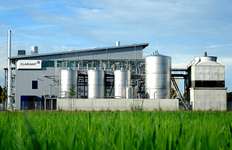- Clariant tested 30 tons of miscanthus biomass from INA in February.
- The GRACE project is funded by the EU's Horizon 2020 program.
- Miscanthus was converted into lignocellulosic sugars and ethanol.
- Clariant's new plant in Romania will produce 50,000 tons of cellulosic ethanol annually.

Project Overview
Clariant conducted tests on 30 tons of miscanthus biomass provided by INA, Croatia’s leading oil and gas company. The biomass was harvested and baled at INA's demonstration site in Croatia and shipped to Clariant’s pre-commercial sunliquid plant in Straubing, Germany for conversion into lignocellulosic sugars and ethanol.
GRACE Project
INA is a consortium member of the publicly funded project “GRowing Advanced industrial Crops on marginal lands for biorEfineries” (GRACE), which is funded by the EU’s Horizon 2020 research and innovation program. The consortium includes 22 partners from universities, the agricultural sector, and the industry. The project aims to optimize miscanthus value chains, produce sustainable products with strong market potential, and develop miscanthus as a sustainable feedstock for cultivation on marginal, contaminated, and abandoned land.
Testing Results
Final results confirmed that Clariant’s sunliquid technology can successfully convert miscanthus biomass into lignocellulosic sugars and ethanol. The flexible sunliquid process design allows lignocellulosic sugars to serve as an intermediate product for future bio-based chemical production. Clariant’s proprietary enzyme platform for feedstock-specific enzymes can further unlock the potential of miscanthus as an energy crop.
Future Developments
Clariant’s pre-commercial plant has also demonstrated cellulosic ethanol production from various agricultural residues. In late 2022, Clariant began construction on a full-scale commercial cellulosic ethanol plant in Podari, Romania, with an annual production capacity of 50,000 tons. This new plant will serve as a flagship site, confirming the competitiveness and sustainability of the sunliquid technology at a commercial scale.

